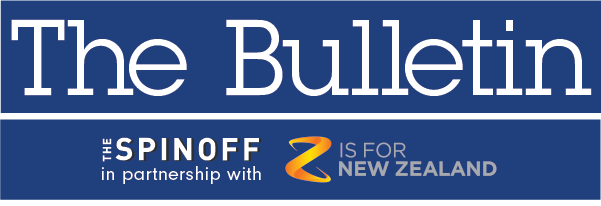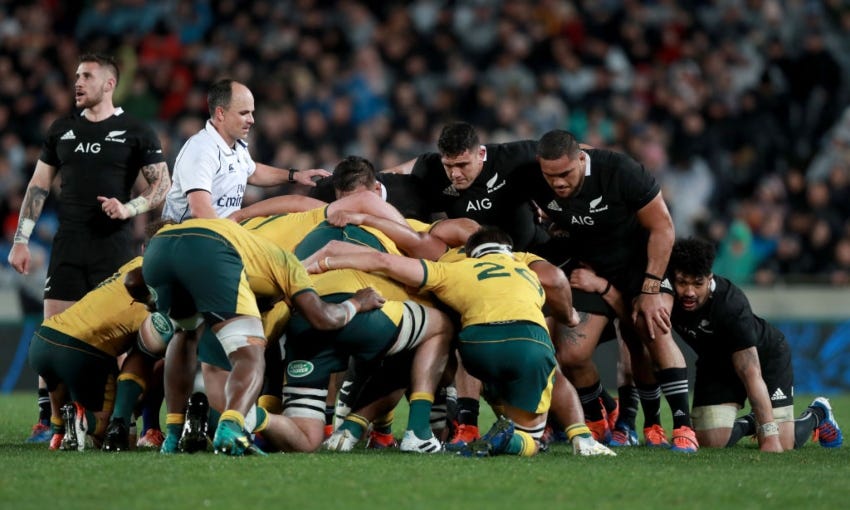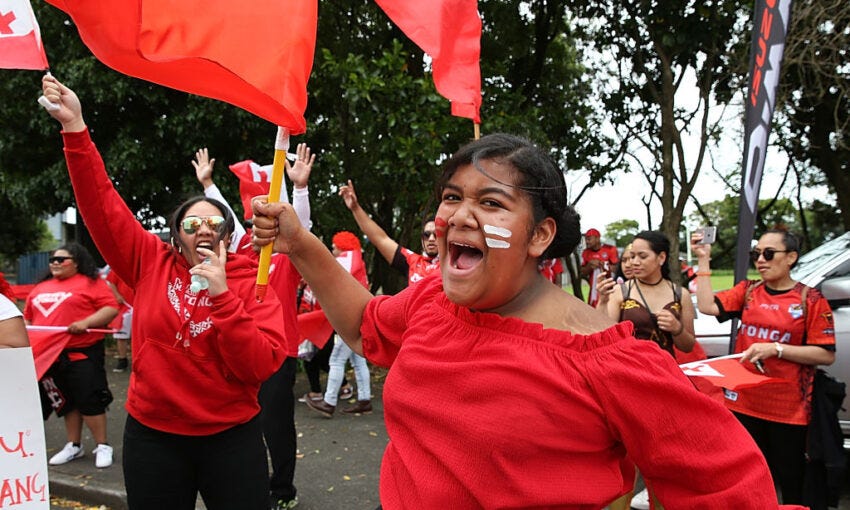NZ Rugby packs down against government
Sports pundits were furious at the government, but might the public see it differently?

Good morning and welcome to The Bulletin for Monday 14 September, by Alex Braae for The Spinoff. Presented in partnership with Z Energy.
In today’s edition: Rugby world gets fired up at government over tournament loss, cabinet to make new alert level decision today, and police commended for not arresting protesters.

Image: A scrum between the All Blacks and Australia in the 2019 Rugby Championship (Getty Images)
The weekend saw an interesting event in the cultural history of this country: The government had a clear opportunity to try and create a good news story around rugby, and chose not to do it. That's one conclusion that can be drawn from a remarkable stoush that erupted over New Zealand's inability to host the Rugby Championship this year, largely because of the country's Covid restrictions.
Who was to blame for the failure to win the bid to host the tournament? The PM blamed "Sanzaar (the tournament organisers) politics" for it not going ahead here – Sanzaar CEO Andy Marinos wholly rejected that, reports the NZ Herald. NZ Rugby CEO Mark Robinson backed that view up, expressing huge disappointment that it didn't go their way, saying hosting the games "was something that was dear to us all."
Columnists close to the rugby community absolutely piled into the maul, with columnist Gregor Paul unleashing on the "self-destructive" government, which he said had a" near irrational and self-destructive refusal to accept that compromise is not weakness." Paul Lewis asserted that it was a political failure, saying "making it easy for the Rugby Championship to be held here would surely have been a sound, pre-election gambit that some kind of return to "normal" is possible in time; a political bone thrown to a largely sports-mad nation." Richard Knowler's take was a bit more nuanced, describing it most of all as a win for Australia, who will now get to host the tournament. Newstalk ZB host Martin Devlin spent the weekend talking about how it showed a lack of courage and can-do attitude.
But hang on – for any of us who count ourselves as part of a sports-mad nation, you'd have to be aware of what's happening in the sports world. The Warriors and Phoenix have had to spend their entire season across the ditch, the NBA and US Open tennis tournaments are being played in empty stadiums, and schedules everywhere are a mess. You simply can't be a sports fan and not know about the raging global pandemic. And every bit of polling we've seen on questions about the Covid response suggests that stronger and more protective measures are overwhelmingly popular, as opposed to opening up. If the public end up seeing it as a choice between rugby and pandemic prevention, I can't help but think they'd back the government's view.
The most interesting take on it all that I've seen comes from the Sportsfreak blog, by guest writer Aiden McLaughlin. He's picked out a detail in the statement that has largely been missed – ‘commercial underwriting.’ It may simply be that the whole thing came down to Australia putting up a more financially compelling bid. McLaughlin also concluded by noting that we still don't actually know if the tournament will go ahead, and given the year it has been, probably won't until the teams are actually out on the field.
Cabinet will make a decision today on alert levels, both for Auckland and the rest of the country. At this stage, it doesn't look like it'll suddenly be open season. Radio NZ quoted expert Michael Baker, who said he'd like to see Auckland remain at 2.5, but said there may be scope for the rest of the country to come down to something like 1.5 (if only the original scale had more numbers in it, but here we are.) New cases keep on trickling in from the Auckland cluster, including a health worker at the Jet Park quarantine hotel. And as Toby Manhire reports, some new locations of interest have been added around Auckland.
A protest took place in Auckland over the weekend on a range of disparate topics, but most notably against future Covid-19 lockdowns. Billy Te Kahika Jr and Jami-Lee Ross were heavily involved in organising it, with the event being something of a culmination of several weeks of protests taking place in regional centres. With the obvious flouting of level two restrictions (that being sort of the point) there was some suggestion that police should have made arrests – Radio NZ spoke to science denial expert Dr Fiona Crichton, who said that the hands-off approach taken by police was the right one, in part because it didn't give the protesters any ammunition for their claims.
Meanwhile, the story of Te Kahika's journey to this point has been chronicled, in a remarkable piece by journalist David Farrier. It starts just before lockdown, and follows the social media posts (and community reaction) as Te Kahika's move conspiracism accelerates. This is something we're going to have to really grapple with culturally – it's fundamentally a story about how social media bubbles have a reinforcing effect on extreme ideas, as opposed to the moderation that can be created by communities coming together and talking about ideas face to face.
Policy announcements: We had a few over Friday and the weekend. Labour put forward two new concrete policies on welfare, in reinstating the training incentive allowance, and increasing the abatement rates for people on a benefit who are working. But the party is still steering clear of any sort of mass-implementation of the Welfare Expert Advisory Group recommendations. There was a promise to extend living wage guarantees across public sector contractors. And there was also new policy around border exemptions aimed at restarting the flow of skilled workers and immigrants, albeit with strict conditions staying in place, reports Justin Giovannetti.
National will aim to incentivise electric vehicles by exempting them from road user charges until at least 2023, reports Newshub. The party also set a target of 80,000 EVs on the road in the same timeframe – which is slightly ahead of what market forces are expected to deliver. It is an area where the government has been mired in in-fighting, stalling meaningful progress over the term, which presents an opportunity for the opposition to show what they’d do better. Unfortunately, National are continuing to push the absurd and elitist idea that EV drivers should be allowed to use bus lanes.
NZ First committed to a big increase in government funding for the St John Ambulance service, reports the NZ Herald. But they stopped short of a 100% funding commitment, going from the current rate of 72% government funded up to 90%. Winston Peters said this would be a bottom line of any coalition negotiation.
And the Greens have made a big push around organic and regenerative farming, reports Stuff. Part of their policy is around making changes at the government-owned Pamū Farms. The part aimed at private farms would involve a levy on nitrogen and phosphorus fertilisers, which would then be gathered up and distributed to farmers to institute more regenerative practices and decarbonise.
If you're already sick of the almost comically adversarial style of politics, watch this debate. Health minister Chris Hipkins and National's health spokesperson Dr Shane Reti went face to face on Newshub Nation, in a discussion that was a genuine exchange of ideas, both on points of common ground and disagreement.
Got some feedback about The Bulletin, or anything in the news?
Drop us a line at thebulletin@thespinoff.co.nz

Right now on The Spinoff: Starting with politics – Taxation academic Jonathan Barrett writes about how neither major party is willing to address the existing unfairness in the tax system. Laura O’Connell Rapira writes about tino rangatiratanga and reimagining completely new power structures. Josie Adams goes to see previous National party leaders Todd Muller and Simon Bridges share the same debate stage. Michael Andrew asks a range of politicians for their plans for fixing the economy. Jose Barbosa assesses the video influencer technique of our leading politicians. Alice Webb-Liddall outlines the story behind claims of structural racism at Waikato University.
In other stuff: Sam Brooks reviews going to the theatre at alert level 2.5 in Auckland, with two new shows being opened by the Auckland Theatre Company. Justin Latif speaks to the author of a new book about the remarkable potential the Tongan league team has to inspire the next generation. Dietary Requirements looks at the lockdown sourdough phenomenon. Emma Boyd has a recipe for a lovely looking cauliflower, onion and olive tart.
And finally, this is just a flat out cool piece of work. Sherry Zhang and photographer Edith Amituanai have spent a day in the working life of drain layer Ses Tohi, who is currently running a team working on a new road out by Auckland airport.
For a feature today, a brilliant exploration of the nature of aerial photography in the time of Covid. Writing on Real Life Mag, Kelly Prendergrast has looked at the way the format has captured some of the defining images of the pandemic, and how that also reflects some of the ways the format has been used in the past. Here's an excerpt:
Throughout the development of drone photography and aerial surveillance, the perspective of the surveilled is scarcely considered. The surveilled — the person on the ground, the “target” — is transformed into an abstracted other. Muslim, terrorist, protester, criminal: the weaponized eye turns those in view into inscrutable enemies, whose movements can be analyzed but whose psychology remains opaque.
Even as drone photography and aerial surveillance have pushed far beyond purely military uses, the weaponization of drone sight remains. While today’s police and consumer quadcopters are generally unarmed, these tools of surveillance and image-making continue to turn people into targets, and normal human activity into datasets and patterns. With its robotic, jolting movement and top-down view, the drone embodies the implicit hierarchy of vision where to be powerful is to be above looking down, and to be on the ground looking up is to be disempowered, attacked, suspicious.
A good day out in Inglewood, as Taranaki got their Mitre-10 cup campaign underway. I was in the town a few days ago, and to be honest was a bit skeptical about how they were going to make their plan of a socially distanced sports game take place, with different groups of a hundred coming in. But as the Taranaki Daily News reports, they made it work very well. Around the grounds, there were some monster scores run up in both the Mitre 10 Cup and the Farah Palmer Cup – to give you a sense of that, so far in the latter North Harbour have given up 156 points in just two games. Meanwhile in the men's comp, Southland hooker Jason Rutledge came off the bench at the age of 42, to help his province secure a rare win.
That's it for The Bulletin. If you want to support the work we do at The Spinoff, please check out our membership programme




